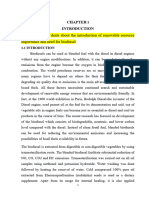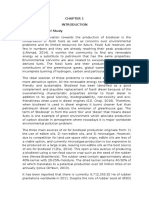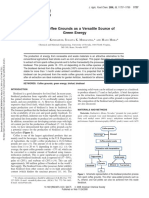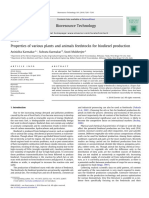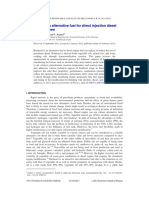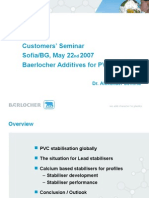Biofuels Candlenut Oil 1
Biofuels Candlenut Oil 1
Uploaded by
api-707995869Copyright:
Available Formats
Biofuels Candlenut Oil 1
Biofuels Candlenut Oil 1
Uploaded by
api-707995869Original Title
Copyright
Available Formats
Share this document
Did you find this document useful?
Is this content inappropriate?
Copyright:
Available Formats
Biofuels Candlenut Oil 1
Biofuels Candlenut Oil 1
Uploaded by
api-707995869Copyright:
Available Formats
BIOFUELS:
CANDLENUT
OIL
Shaah, M., Allafi, F., Hossain, M,S., Alsaedi, A., Ismail, N., Kadir, M. and Ahmad, M. (2021)
'Candlenut oi: review on oil properties and future liquid biofuel prospects.', International
Journal of Energy Research, 45, pp. 17057-17079. Available at: DOI: 10.1002/er.6446
AN INTRODUCTION TO BIOFUELS
The fast depletion of diesel fuel, rise in energy demand, and
environmental pollution concerns are causing an increase in global
interest in the production of liquid biofuels. Biofuel (bio-aviation
and biodiesel) is a possible and potential alternative to diesel fuel
to help mitigate environmental impacts of future energy demands.
Crop oil that is non-edible
is said to be a potential
feedstock to produce liquid
biofuel considering the
high demand for edible oil
as a food source.
The major limitation of
using non-edible crop oil to
produce biofuel is the high
cost of feedstocks and the
limited supply of extensive
biodiesel production.
CANDLENUT OIL
Candlenut trees can grow arid and harsh climates because of their
low moisture requirements. Therefore, candlenut can be grown in
unused lands, for example in deserts riverbanks and other
wastelands that are unsuitable for edible crops
In addition, candlenut seeds have huge
amount of oil (30%-60%). Therefore,
candlenut oil is a very promising source
for commercial biodiesel production.
The tree can grow in soils with
pH of 5-8 at 18 -28 Celsius
degrees and rainfall of 6500-
4000mm.
ADVANTAGES OF BIODIESEL:
Biodiesel is a renewable energy source, meaning that they can support a
continuous supply chain.
It is environmentally friendly energy source that emits fewer greenhouse
gases compared to diesel.
Biodiesel has a molecular structure that is highly biodegradable with
minimal combustion toxicity.
LIMITATIONS OF BIODIESEL:
Produces higher NOX emissions than diesel fuel.
Provides 5% less engine power and speed than diesel fuel
It is degradable when stored over a long period.
The World total primary energy supply in 2016
You might also like
- HSBDocument10 pagesHSBwilmarub71% (17)
- Chapter - 1: 1.1 History of BiodieselDocument54 pagesChapter - 1: 1.1 History of BiodieselSubbu SuniNo ratings yet
- Renewable Energy: Adeniyi Abiodun Adenuga, Oluwatope Olaniyi Idowu, John Adekunle Oyedele OyekunleDocument8 pagesRenewable Energy: Adeniyi Abiodun Adenuga, Oluwatope Olaniyi Idowu, John Adekunle Oyedele OyekunlebaharudinNo ratings yet
- Abdullah DKK (2013) PDFDocument6 pagesAbdullah DKK (2013) PDFTomy Wijaya PutraNo ratings yet
- Production and Characterization of Biodiesel FromDocument15 pagesProduction and Characterization of Biodiesel FromInternational Journal of Innovative Science and Research TechnologyNo ratings yet
- Candlenut Oil: Review On Oil Properties and Future Liquid Biofuel ProspectsDocument24 pagesCandlenut Oil: Review On Oil Properties and Future Liquid Biofuel ProspectsdesniaNo ratings yet
- Comparison Between Biodiesel Production From Raw Vegetable Oil and Waste Cooking OilsDocument11 pagesComparison Between Biodiesel Production From Raw Vegetable Oil and Waste Cooking OilsSowmiya. A Asst. Prof / ChemicalNo ratings yet
- Coconut Waste As A Source For BiodieselDocument3 pagesCoconut Waste As A Source For Biodieselsebiotimo rasheedNo ratings yet
- Coconut Waste As A Source For Biodiesel Production: November 2010Document4 pagesCoconut Waste As A Source For Biodiesel Production: November 2010Vu Thanh ThuongNo ratings yet
- Production of Biodiesel From Waste Cooking Oil and Factors Affecting Its Formation: A ReviewDocument7 pagesProduction of Biodiesel From Waste Cooking Oil and Factors Affecting Its Formation: A ReviewShashikanth MohrirNo ratings yet
- Biodiesel Production - A Mini Review PDFDocument13 pagesBiodiesel Production - A Mini Review PDFyohannes100% (1)
- JCPR 2012 4 9 4219 4230Document12 pagesJCPR 2012 4 9 4219 4230mechveenaNo ratings yet
- 1 s2.0 S2666790824000533 MainDocument17 pages1 s2.0 S2666790824000533 MainFlames ShoppingNo ratings yet
- Extraction of Bio Diesel and Performance Test On CI Engine Fueled by BiodieselDocument68 pagesExtraction of Bio Diesel and Performance Test On CI Engine Fueled by BiodieselRohan VelankarNo ratings yet
- ARUNPRASATHDocument48 pagesARUNPRASATHSolomon DurairajNo ratings yet
- Biodiesel As An Alternative Fuel - by Asst. Prof. Shashi SahuDocument1 pageBiodiesel As An Alternative Fuel - by Asst. Prof. Shashi SahuSuyashsahuNo ratings yet
- Arunprasath 2Document48 pagesArunprasath 2Solomon DurairajNo ratings yet
- A Comparative Study of Diesel Engine Performance and Emission Characteristics of Biodiesel Blends With DieselDocument5 pagesA Comparative Study of Diesel Engine Performance and Emission Characteristics of Biodiesel Blends With DieselerpublicationNo ratings yet
- Pinjern,+paper 3 Tan pg14-19Document8 pagesPinjern,+paper 3 Tan pg14-19imranNo ratings yet
- FypDocument5 pagesFypLyn Dayana YongNo ratings yet
- A Review: Advantages and Disadvantages of BiodieselDocument6 pagesA Review: Advantages and Disadvantages of BiodieselBharath KumarNo ratings yet
- Biofuel and BiodieselDocument16 pagesBiofuel and Biodieseljoe100% (3)
- Production, Characterization and Process Variables of Biodiesel From Non-Edible Plant Oil (Neem & Soapnut) : A ReviewDocument5 pagesProduction, Characterization and Process Variables of Biodiesel From Non-Edible Plant Oil (Neem & Soapnut) : A ReviewJyothi PhaneendraNo ratings yet
- Development of BiodieselsDocument9 pagesDevelopment of BiodieselsARJYA ROYNo ratings yet
- Paper 6 - IJERA 2013Document11 pagesPaper 6 - IJERA 2013KrishnaMurthyTPNo ratings yet
- 2008 Spent Coffee Grounds As A Versatile Source of Green EnergyDocument4 pages2008 Spent Coffee Grounds As A Versatile Source of Green EnergyEddie D SouzaNo ratings yet
- Utilization of Lignocellulosic Biomass by Oleaginous Yeast and Bacteria For Production of Biodiesel and Renewable DieselDocument18 pagesUtilization of Lignocellulosic Biomass by Oleaginous Yeast and Bacteria For Production of Biodiesel and Renewable DieselIkrar AdiNo ratings yet
- Soap NutDocument9 pagesSoap NutkismuganNo ratings yet
- Ashok PDFDocument9 pagesAshok PDFalfianNo ratings yet
- Calophyllum Inophyllum Methyl Ester Biodiesel Blend As An Alternate Fuel For Diesel Engine ApplicationsDocument9 pagesCalophyllum Inophyllum Methyl Ester Biodiesel Blend As An Alternate Fuel For Diesel Engine ApplicationsalfianNo ratings yet
- Renata N. Vilas Bôas and Marisa F. MendesDocument12 pagesRenata N. Vilas Bôas and Marisa F. MendesMaria Luiza MilhomemNo ratings yet
- Production of Biodiesel From Used Cooking OilDocument7 pagesProduction of Biodiesel From Used Cooking OilDennis OrlandoNo ratings yet
- Overview Challenges in The Production of BiodieselDocument9 pagesOverview Challenges in The Production of BiodieselHugo SantanaNo ratings yet
- SadagobanDocument48 pagesSadagobanSolomon DurairajNo ratings yet
- karmakar2010Document10 pageskarmakar2010acecementprodutsNo ratings yet
- What Is Biodiesel?Document6 pagesWhat Is Biodiesel?Sandra GilbertNo ratings yet
- South African Journal of Chemical Engineering: SciencedirectDocument6 pagesSouth African Journal of Chemical Engineering: SciencedirectAndreea MadalinaNo ratings yet
- 406 Chapter1Document1 page406 Chapter1priyankaNo ratings yet
- Biodiesel As An Alternative Fuel For Direct Injection Diesel Engines: A ReviewDocument18 pagesBiodiesel As An Alternative Fuel For Direct Injection Diesel Engines: A Reviewmert tıglıNo ratings yet
- Simulation of Jatropha Biodiesel Production Using Superpro DesignerDocument28 pagesSimulation of Jatropha Biodiesel Production Using Superpro DesignerFauzulNo ratings yet
- 84 Comparision of Fuel Properties of Biodiesel Fuels Produced From Different OilsDocument7 pages84 Comparision of Fuel Properties of Biodiesel Fuels Produced From Different OilsSergio CaicedoNo ratings yet
- Biodiesel: An Alternative Fuel: February 2008Document11 pagesBiodiesel: An Alternative Fuel: February 2008yohannesNo ratings yet
- Renewable and Sustainable Energy ReviewsDocument9 pagesRenewable and Sustainable Energy ReviewsAndreea MadalinaNo ratings yet
- Biodiesel: An Alterante To Conventional Fuel: Arihant Jain 190107011Document8 pagesBiodiesel: An Alterante To Conventional Fuel: Arihant Jain 190107011arihant jainNo ratings yet
- Inophyllum Seed Oil From Kendari Using Ethanol Solution: Ind. J. Chem. Res., 2017, 4 (2), 406-412Document7 pagesInophyllum Seed Oil From Kendari Using Ethanol Solution: Ind. J. Chem. Res., 2017, 4 (2), 406-412putriNo ratings yet
- Assignment PDFDocument19 pagesAssignment PDFAr Varun Verma100% (1)
- Biodiesel Refers To A Non-Petroleum-Based Diesel Fuel Consisting of ShortDocument12 pagesBiodiesel Refers To A Non-Petroleum-Based Diesel Fuel Consisting of Shortchoureyshishir73No ratings yet
- Bio DieselDocument26 pagesBio Diesel2k20THE22 Vaibhav Sharma100% (1)
- Non-Conventional Seed Oils As Potential Feedstocks For Future Biodiesel Industries: A Brief ReviewDocument6 pagesNon-Conventional Seed Oils As Potential Feedstocks For Future Biodiesel Industries: A Brief ReviewAhmed SajitNo ratings yet
- StageDocument7 pagesStageshanmukh0793No ratings yet
- Production of Biodiesel From Watermelon Seed and Juliflora Seed For Using Performance AnalysisDocument68 pagesProduction of Biodiesel From Watermelon Seed and Juliflora Seed For Using Performance Analysisk eswari100% (1)
- Production and Characterization of Biodiesel From Indigenous Castor SeedsDocument6 pagesProduction and Characterization of Biodiesel From Indigenous Castor SeedserpublicationNo ratings yet
- Bio Diesel R & C 1 ReportDocument60 pagesBio Diesel R & C 1 Reportnstmd42zn2No ratings yet
- 1 s2.0 S266682112200045X MainDocument31 pages1 s2.0 S266682112200045X MainIrfani Mauludiyah FitriNo ratings yet
- Production and Characterization of Biodiesel From Nigerian Mango Seed OilDocument5 pagesProduction and Characterization of Biodiesel From Nigerian Mango Seed OilMáximo Décimo MeridioNo ratings yet
- 1 s2.0 S1364032118301588 MainDocument14 pages1 s2.0 S1364032118301588 MainsylvieliraNo ratings yet
- BiodieselDocument21 pagesBiodieselAsiiimweNo ratings yet
- Project Proposal 9thDocument30 pagesProject Proposal 9thJonah Kimetto Kandaa100% (3)
- 1 s2.0 S1364032117312534 MainDocument23 pages1 s2.0 S1364032117312534 MainFernando HenriqueNo ratings yet
- Biodiesel Production101: Homebrew Edition: A Do It Yourself Guide to Produce Biodiesel on Your BackyardFrom EverandBiodiesel Production101: Homebrew Edition: A Do It Yourself Guide to Produce Biodiesel on Your BackyardNo ratings yet
- Interzinc 22 MSDS PDFDocument9 pagesInterzinc 22 MSDS PDFRameshNo ratings yet
- Chapter 10: Chemical Bonding: Lewis TheoryDocument16 pagesChapter 10: Chemical Bonding: Lewis TheoryDeccanNo ratings yet
- ATM-3 - The 2nd Law of ThermodynamicsDocument39 pagesATM-3 - The 2nd Law of Thermodynamics廖奕翔No ratings yet
- Fire Safety Gazette NotificationsDocument157 pagesFire Safety Gazette NotificationsRaghuNo ratings yet
- Analysis Past Year Chemistry SPM Question (2003-2014)Document6 pagesAnalysis Past Year Chemistry SPM Question (2003-2014)Siti Hajar Abd HamidNo ratings yet
- MSDS 1044 EngDocument9 pagesMSDS 1044 EngchimexportNo ratings yet
- Preparation of Ceramic Powders: 2.1 Introduction and BackgroundDocument46 pagesPreparation of Ceramic Powders: 2.1 Introduction and BackgroundLukmanCibroNo ratings yet
- SBA 3 ChromatographyDocument6 pagesSBA 3 ChromatographyDaniel DowdingNo ratings yet
- Assumptions Used in Waste Water Treatment PlantDocument10 pagesAssumptions Used in Waste Water Treatment Plantmubashar husain ansarNo ratings yet
- Day14 - Gen. Chem 2 - SASDocument6 pagesDay14 - Gen. Chem 2 - SASBilly PestañoNo ratings yet
- Pentek Big Blue Housings PDFDocument2 pagesPentek Big Blue Housings PDFLiz Bargola SamsonNo ratings yet
- Chapter 2 SlidesDocument26 pagesChapter 2 SlidesAzizIkramNo ratings yet
- A Study On Spinel Formation PDFDocument5 pagesA Study On Spinel Formation PDFBagas Prasetyawan Adi NugrohoNo ratings yet
- Atomic Theory 2Document17 pagesAtomic Theory 2Liz EvermoreNo ratings yet
- Baerlocher PVC Profiles 2007 SofiaDocument27 pagesBaerlocher PVC Profiles 2007 SofiaSaša AleksićNo ratings yet
- Che 329 - Lectre - 2Document95 pagesChe 329 - Lectre - 2anandseshadri901No ratings yet
- Tablas CeneguelDocument1 pageTablas CeneguelMargarito Robles KingNo ratings yet
- Sasol Sales - Spec - 8Document1 pageSasol Sales - Spec - 8Shailesh JainNo ratings yet
- Bond Work Index Formula-Equation - Mineral Processing & Extractive MetallurgyDocument6 pagesBond Work Index Formula-Equation - Mineral Processing & Extractive MetallurgyJohn Calero Ortega100% (1)
- Life Cycle AnalysisDocument14 pagesLife Cycle AnalysisAshesh PradhanNo ratings yet
- Urinalisis: Dr. Cici Julia Sri Dewi, SP - PKDocument37 pagesUrinalisis: Dr. Cici Julia Sri Dewi, SP - PKOktavia ManullangNo ratings yet
- Quantum Dot-Aluminum Phthalocyanine Conjugates Perform Photodynamic Reactions To Kill Cancer Cells Via Fluorescence Resonance Energy TransferDocument8 pagesQuantum Dot-Aluminum Phthalocyanine Conjugates Perform Photodynamic Reactions To Kill Cancer Cells Via Fluorescence Resonance Energy TransferAnneNo ratings yet
- 1st Quarter Reviewer ELECTRONICSDocument4 pages1st Quarter Reviewer ELECTRONICSBless Gidien EspedionNo ratings yet
- Gal Val Um East M Steel PropertiesDocument5 pagesGal Val Um East M Steel PropertiesAhmed BelalNo ratings yet
- V 6000 DBalansDocument20 pagesV 6000 DBalansYalcin DogrulNo ratings yet
- Detection of Adulteration in Milk A ReviewDocument21 pagesDetection of Adulteration in Milk A ReviewLabconquim SAS LaboratorioNo ratings yet
- Thermodynamics Problem Solving in Physical Chemistry Study Guide and Map by Kathleen E. Murphy PDFDocument139 pagesThermodynamics Problem Solving in Physical Chemistry Study Guide and Map by Kathleen E. Murphy PDFAlmagro Pérez100% (1)
- King Na Lube EP 5000Document8 pagesKing Na Lube EP 5000cotteNo ratings yet
- Palais Royale Shreeram MillsDocument2 pagesPalais Royale Shreeram MillsRaj RathoreNo ratings yet














